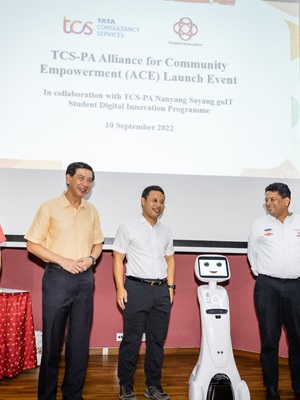‘Hey, I cannot see you when I switch off the lights!’ ‘Hey, all Indians are good at Math, right? Help me do my homework.’ ‘Are you sure that you don’t eat prata and curry everyday?’ Whenever Kumar tries to recall the times he was mistreated because of his race, feelings of disgust would often conjure up within him and tears would well up in his eyes. These are the jokes that Kumar has been subjected to while growing up in Singapore. Even though he was born and raised in Singapore, he often feels alienated from Singapore society, knowing that as a minority, he would often be subjected to jokes that the majority race makes on a regular basis. He often questions what he has done to deserve to be at the centre of jokes and sometimes, he even wishes that he belonged to the majority race.
This is a reflection of the experiences that most minorities in Singapore would have faced throughout their lives while growing up in Singapore. Even though Singapore has often prided itself as a multiracial country, with the rhetoric of equal treatment propagated in many facets of society such as even finding ‘regardless of race’ in the national pledge, this unfortunately does not materialise for many minorities simply because of how the jokes and comments are a stark reminder of the stark differential treatment that minorities face on a regular basis. However, many people are oblivious to the harm of these jokes and comments and would even ask ‘How are these jokes malicious? They are just casual statements only and there is no harm in making these jokes.’ or assert that these jokes and comments are not malicious and say ‘Just relax only, these jokes are just a small matter. No need to blow it out of proportion.’ Even though many think that these are just mere innocent jokes and comments, they are actually not innocuous at all. This phenomenon is also known as casual racism.
Casual racism, as defined by the Australian Human Rights Commission, is the conduct involving negative stereotypes or prejudices about people on the basis of race, colour or ethnicity. Examples include jokes, off handed comments and exclusion of people from social situations on the basis of race. Casual racism also is not necessarily confined to jokes targeted at a minority group but also encompasses alienating them unintentionally by speaking in another language that minorities do not understand, or even being insensitive towards the characteristics of a certain race’s culture, such as the failure to cater food to races with dietary restrictions in social settings. Casual racism, unlike overt and blatant racism, is done in a subtle and casual manner - causing jokes and comments to be normalised and allowing them to pass off as just innocuous remarks.
One may think that casual racism only materialises in everyday interactions but this is unfortunately not the case. In fact, casual racism is displayed the most prominently at workplaces because many spend most of their day at work where interactions are plentiful. Thus, minorities are subjected to brutal discrimination such as the feeling of alienation or feeling a huge sense of displacement when their colleagues start conversing in Chinese or even feeling excluded when their superiors do not cater Halal or vegetarian food for them during business functions.
In the case of Kumar, when he was serving his National Service as an administrative clerk in the Air Force division, he recalled being alienated and alone because he did not resonate with anyone at the workplace. His colleagues often resorted to conversing in a mixture of Chinese and English because Chinese was a common language that was familiar to his colleagues. Soon, his colleagues started conversing in full Chinese, causing Kumar to be gradually left out of conversations because Kumar did not comprehend what they were saying in Chinese, let alone know how to speak Chinese. This resulted in Kumar being left with nobody to talk to at the workplace, causing him to dread going to work everyday.
However, this did not stop there. Kumar’s superiors were Chinese and they relished the fact that Kumar could not comprehend Chinese at all. Thus, they resorted to using Chinese to talk to the various superiors and subordinates when they wanted to express their discontentment towards Kumar without Kumar knowing that he was being gossiped about. With the superiors scrutinising Kumar’s actions and admonishing him when he was unable to perform additional ‘requirements’ set by them such as memorising their coffee orders to the detail, this caused Kumar to feel frustrated and overwhelmed by the ridiculous ‘requirements’. This culminated into him feeling demotivated at his workplace because he was unable to meet the ludicrous expectations imposed on him, resulting in constant fatigue and mental stress, which caused him to make mistakes at work. The gossip thus ensued in the workplace because of Kumar’s perceived incompetence and soon caught hold of the General’s attention in the workplace, causing Kumar to be demoted to an elementary position where he was constantly passed up for promotions because he was unable to ‘display group cohesion with the rest’ and ‘speak Chinese’.
Additionally, his superiors constantly conveniently ‘forgot’ that Kumar was not a member of the Chinese race and often failed to cater to Kumar’s dietary restrictions when the office hosted celebrations. Kumar recalled how he had to bring his own food to the office because the superiors said that they had ‘no money’ to specially cater Vegetarian food to him. This resulted in him eating alone and awkwardly standing at one corner to finish his food while the rest indulged in the food catered in the office.
These experiences culminated into unpleasant memories for Kumar. Hence, when Kumar finally finished his stint in National Service, he swiftly dropped off his uniform and never went back again because he did not want to recount the relentless and brutal discrimination that he felt back there.
Therefore, when we take a step back from the anecdote illustrated earlier, it is important to recognise that casual racism is a cause for concern because it ultimately serves to prove one thing: it is discriminatory in nature and only serves to alienate the minorities. Minorities in Singapore are already conscious of their race simply because identification markers of their race such as their skin colour and facial features are distinctly different from the majority race, making them feel out of place. Jokes and comments made about their race and actions displaying prejudices towards them do not help alleviate this sense of displacement in Singapore, they serve only to propagate the majority’s disparaging and condescending sentiments towards them. This reinforces the preconceived notions towards their race and entrenches the prevailing stereotypes about them, thus perpetuating greater racial divide in Singapore.
Additionally, casual racism only serves to widen the income gap between the majority and minority races. This is because superiors might belong to the majority race and might harbour certain misconceptions towards the minority races. With this gross misconception about the minority races, such as perceiving them as ‘less competent’ or ‘less hardworking’, this would mean that minority races are being passed up for promotions, causing them to fall behind in the corporate ladder. Additionally, in business functions, when superiors cater food, they might not be sensitive to the dietary restrictions of the minority races. Thus, due to the minorities’ inability to eat the food catered, they would be more inclined towards skipping business functions, causing them to miss out on a wealth of networking opportunities. This confluence of factors only serves to reinforce the stagnation of career advancement opportunities for the minorities. The lack of career progression would impede their ability to prove that they can excel in the various fields of work because of the dearth of opportunities that they face, resulting in them facing little remuneration at work. This causes the minorities to feel less motivated in their work because of the unfair compensation that they receive for their work, which would only fuel and feed the negative sentiments and stereotypes that the superiors of the majority race harbour towards them. Thus, this creates a vicious cycle of minorities being perceived as ‘less hardworking’ and further entrenches these stereotypes of the minorities.
All in all, casual racism thus should be a huge concern and it is imperative for us to address casual racism swiftly before it becomes too entrenched in society.
Posted 01/03/2024

















